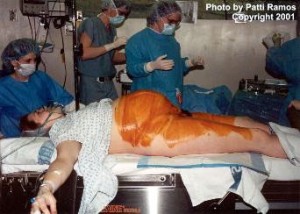 This post includes excerpts from several documents including:
This post includes excerpts from several documents including:
1. ACOG Opinions no. 166 & no. 214 – pertinent excerpts of committee opinion upholding patient rights for pregnant women as a matter of ACOG policy, stating that:
“abiding by the patient’s autonomous decision will provide the best care for the pregnant woman and the fetus in most circumstances.”
“In the event of an emergency … the obstetrician must respect the patient’s autonomy, continue to care for the pregnant woman, and not intervene against the patient’s wishes, regardless of the consequences.”
After an obstetrician ordered hospitalization for prolonged bedrest she requested a second opinion. What she received instead was court-ordered hospitalization that included forced delivery by Cesarean at the obstetrician’s discretion.
3. Excerpts from Gabbe’s OBSTETRICS (1991) chapter 42 “Legal and Ethical Issues in Perinatology” ~ finding that forced Cesareans are legally unsupported; quote from 1990 District Court of Appeal’s decision reiterating ACOG’s 1987 policy on “Patient Choice: Maternal-fetal Conflict“. The Court confirmed the legal theory that informed decisions by pregnant women, including declining recommended obstetrical interventions, must be honored in all but “extremely rare and truly exceptional circumstances“.
Excerpts ~ ACOG Committee Opinions 166 $ 214 ~
Opinion #166 ~ “Informed Refusal” ~ notes:
Almost universally, informed consent laws have been liberalized … from the relatively paternalistic “professional or reasonable physician” standard to the “materiality of patient viewpoint” standard. … In the “patient viewpoint” standard, a physician must disclose … the risks and benefits that a reasonable person in the patient’s position would want to know in order to a make an “informed” decision.
Opinion 214: “Patient Autonomy: The Maternal-Fetal Relationship” states that:
- … medical knowledge has limitations and medical judgment is fallible. Existing methods for detection … are not always reliable indicators of poor outcome, and there is often insufficient evidence for risk-determination or risk-benefit evaluation
- The role of the obstetrician should be one of an informed educator and counselor, weighing risks and benefits ….and realizing that tests, judgment, and decisions are all fallible.
- Abiding by the patient’s autonomous decision will provide the best care for the pregnant woman and the fetus in most circumstances.
- In the event of an emergency … the obstetrician must respect the patient’s autonomy, continue to care for the pregnant woman, and not intervene against the patient’s wishes regardless of the consequences.
ACOG Opinion 214 also identifies serious negative consequences when a patient’s autonomy is violated:
- A woman is wronged and may be harmed, whether physically, psychologically or spiritually.
- The patient’s subsequent loss of trust in the healthcare system may reduce the health care provider’s ability to help her and may deter others from seeking care.
- There may be other social costs associated with this violation of individual liberty.
According to ACOG Opinion 214: “abiding by the patient’s autonomous decision will provide the best care for the pregnant woman and the fetus in most circumstances”.
This policy statement goes on to say that: “In the event of an emergency … the obstetrician must respect the patient’s autonomy, continue to care for the pregnant woman, and not intervene against the patient’s wishes, regardless of the consequences.”
Referrance: ACOG Compendium page 160, April 1999
@@@@@ ~ ASIDE ~ @@@@@

What happens when obstetricians do NOT practice what they preach and do ultimate harm with no upside for either mother or baby:
In December 2015, Harpers‘ magazine published a well-researched article about obstetrician-ordered bed rest for pregnant women, revealing that the practice of sending women to prolonged bed rest was actually not evidenced-based and the reputable research actually shows it to be harmful to the childbearing woman and associated with a substantial INCREASE in pre-term births.
Bed rest does not protect vulnerable pregnancies or prevent premature births. It is as harmful to the pregnant woman’s body as the prolonged weightlessness of space travel resulting in demineralization of bone, muscle wasting, stress on the kidneys and cardiac abnormalities.
But most importantly, bedrest is actually associated with an increased rate of premature birth.
Science to the contrary, approximately 700,000 pregnant women in American are put on bedrest each year by their obstetricians. As is often the case, a physician’s order is assumed to be the definitive word on these issues, and takes on legal implications for anyone who declines an MD-recommended treatment or asks for a second opinion.
Here is one such story.
In 2009, Samantha Burton, a young mother of two older children, experienced symptoms of preterm labor fifteen weeks before her due date and went voluntarily to Tallahassee Memorial Hospital. She was seen by an obstetrician who told her that she would have to be admitted and remain in bed.
Burton, who had two small children, agreed to bed rest but wanted to go home. She also wanted a second opinion. The obstetrician told Samantha that she would not be allowed to leave, and then the doctor initiated legal proceedings to confine Ms. Burton to the hospital.
The judge found in favor of the hospital and issued a court order mandating hospital bed rest, medication to prolong Burton’s pregnancy, and, if necessary, forced delivery.
Three days later, Burton was delivered by caesarean section; her extremely premature baby never breathed and was declared to be stillborn.
This tragedy would not have happened had ACOG Committee Opinions #166, #214 and #669 been followed.
Chapter 42 “Legal and Ethical Issues in Perinatology”
The view women who refuse to Cesarean sections are in some way willfully abusing their fetuses seems prevalent and deeply held belief, at least buy some male obstetricians and judges. This opinion is reflected in several cases in which judges have ordered women who are refusing Cesarean sections during labor to undergo the procedure “for the welfare of the unborn child”.
In 1987 Kolder et al (13 Kolder et al, NEJM 316:1192, 1987) reported in the US national survey that showed court orders have been obtained for Cesarean forced in 11 states, and for hospital detentions in two states. Among 21 cases in which court orders were sought they were obtained within six hours in an average of 87% of the cases.
The majority of the women involved were black, Asian, or Hispanic, and all were poor. Nearly one-half were unmarried and one-fourth did not speak English as their primary language.
The survey also found that 46% of the heads of fellowship programs in maternal fetal medicine thought that women who refuse medical advice and thereby endanger the life of the fetus should be detained.
In the vast majority of these cases judge were called on an emergency basis and ordered interventions within hours. Judges usually went to the hospital. Physicians should know what most lawyers and almost all judges know: when a judge arrives at the hospital in response to an emergency call, he or she is acting much more like a lay person than a jurist.
Without time to analyze issues, without representation for the pregnant woman, without briefing or thoughtful reflection on the situations, and almost total ignorance of the relevant laws, and in an unfamiliar setting faced by a relatively composition physician and a woman who can easily be labeled “hysterical”, the judge will almost always order whatever the doctor advises.
[However] there is nothing in Roe v. Wade, or any other appellate decisions, that gives either physicians or judges the right to favor the life or well-being of the fetus over that of the pregnant woman.
Nor is there legal precedent for a mother to be ordered to undergo surgery (e.g. kidney or partial liver transplants) to save the life of her dying child. It would be ironic and inconsistent if a woman could be forced to submit to more invasive surgical procedures for the sake of a fetus than that of a child.
Forcing pregnant women to follow medical advice also places unwarranted faith in that advice. Physicians often disagree about the appropriateness of obstetric interventions and they can be mistaken. (16 Notson FC, et al, Comparison of national cesarean sections rates; NEJM 316:336, 1987)
In three of the first five cases in which court-ordered to see her in sections were sought, the women ultimately delivered vaginally and uneventfully. (2 Elias S. et al; Reproductive Genetics and the Law; Year Book Medical Publishers, Chicago, 1987)
In the face of such uncertainty – uncertainty compounded by decades of changing and conflicting expert opinions on the management of pregnancy and childbirth – the moral and legal primacy of the competent, informed pregnant woman in decision-making is overwhelming (17 Annas, GJ, Protecting the liberty of pregnant patients; NEJM 316:1213, 1987)
Physicians may feel better after being “blessed” by the judge, but they should not. ….the appearance of legitimacy is deceptive; the judge has acted injudiciously, and there is no opportunity for meaningful appeal. And … the physician has now helped to transform him or herself into an agent of the state’s authority. (14 Nelson LJ, et al: Compelled medical treatment in pregnant women. JAMA 259:1060. 1973)
Do we really want to attempt to restrain and forcibly medicate and operate on a competent refusing adult? It is not what one generally associates with moderate obstetric care and may possibly cause harm. It also encourages and at the cereal relationship between the obstetrician and the patient. Even from a strictly utilitarian perspective, this marriage is the state in medicine is likely to harm or fetuses than it helps.
This marriage between the state and medicine is likely to harm or fetuses than it helps. Many women will quite reasonably avoid physicians altogether during pregnancy if they believed that not following medical advice can resultant force treatment, involuntary confinement, or criminal charges.
We can obtain access to the fetus only through its mother and in the absence of her informed consent can do so only by treating her as a fetal container and a non-person, without rights to body integrity.
Excerpt from ACOG Committee Opinion “Patient Choice: Maternal Fetal Conflict, 1987 as quoted in Gabbe’s Obstetrics, Chapter 42, 1991 edition:
3. Obstetricians should refrain from performing procedures that are unwanted by a pregnant woman. The use of judicial sortie to implement treatment regimes in order to protect the fetus violates the pregnant woman’s autonomy. Furthermore, appropriate reliance inappropriate reliance on judicial authority may lead to undesirable consequences, such as the criminalization of noncompliance with medical recommendations.
In 1990, the District of Columbia Court of Appeals, In a strongly worded opinion, sinfully adopted the American College of obstetricians and gynecologists statement as law, holding that the decision of the pregnant woman must be honored in all but “extremely rare and truly exceptional circumstances“ (19 In re: A.C. 573 A. 2nd 1235 (D.C. App. 1990)
